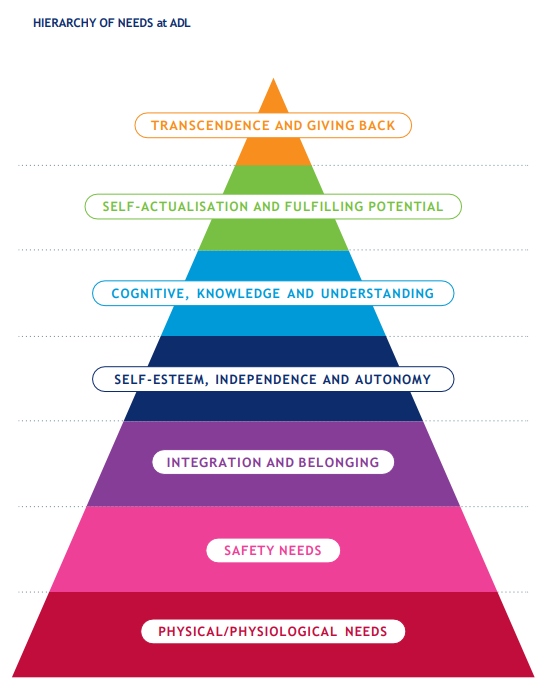At ADL, we support our high-quality provision through an inclusive approach drawing on the Outcomes First Group’s expertise with neurodivergent and emotionally based school avoidance (EBSA) young people, Trauma Informed Practice (TIP), and clinical support.
This is complemented by ensuring that our resources are easily accessible to SEND learners through the digital platforms that we use to deliver education in live online lessons by qualified teaching staff with a wealth of experience.
At ADL, we understand the importance of supporting the whole child, and Key Teachers take a lead role in supporting from a pastoral, therapeutic and advocacy viewpoint. We follow Universal Design principles and believe that looking at all our young people through an SEMH lens and designing for TIP and neuro-affirming needs ensures that ALL students will benefit. The different levels of the pyramid below consider the basic requirements that young people need to live, to feel safe, to feel a sense of belonging, confidence and self-fulfilled, enabling them to access and participate in any experience.

At ADL we:
- Ensure that pupils with SEND engage in the activities of the school alongside pupils who do not have SEND.
- Ensure there is high-quality provision to meet the needs of pupils with SEND, with specific focus on inclusive practice, and removing barriers to learning.
- Fulfil statutory duties towards pupils with SEND, considering the SEND code of practice.
- Promote disability equality and equality of opportunity, fulfilling duties under the Equality Act 2010 towards individual disabled pupils.
- Make reasonable adjustments, including the provision of auxiliary digital aids and services, to ensure that disabled pupils are not at a substantial disadvantage compared with their peers.
Once a pupil has been identified with SEND, ADL will employ a graduated approach to meeting the pupil’s needs. This will be through the adoption of a four-part cycle – assess, plan, do, review – whereby earlier decisions and actions are revisited, refined and revised with a growing understanding of the pupil’s needs, and of what supports individuals making good progress, and securing good outcomes. The process is as follows:
- Assess: establishing a clear assessment of the pupil’s needs
- Plan: agreeing the adjustments, interventions and support to be put in place, as well as the expected impact on progress, development or behaviour, along with a clear date for review
- Do: implementing the agreed interventions and support
- Review: analysing the effectiveness of the interventions and their impact on the pupil’s progress in line with the agreed review date
Where higher levels of need are identified, ADL will refer back to home school/client to suggest they access specialised assessments from external agencies and professionals.
At present pupils with Education and Health Care (EHC) Plans are the responsibility of clients. However, ADL will:
- Ensure that teachers monitor and review the pupil’s progress during the year and assist our clients with a formal review of the EHC plan at least annually.
- Cooperate with the client and relevant individuals to ensure an annual review meeting takes place.
- Request that the appropriate people are given at least two weeks’ notice of the date of the meeting, such as key teachers.
- Seek advice and information about the pupil prior to the annual review meeting from all parties invited, and send any information gathered to all those invited, at least two weeks in advance of the meeting.
The SEND policy is reviewed on an annual basis by the headteacher in conjunction with the governing board and is available in the policies section of our website.